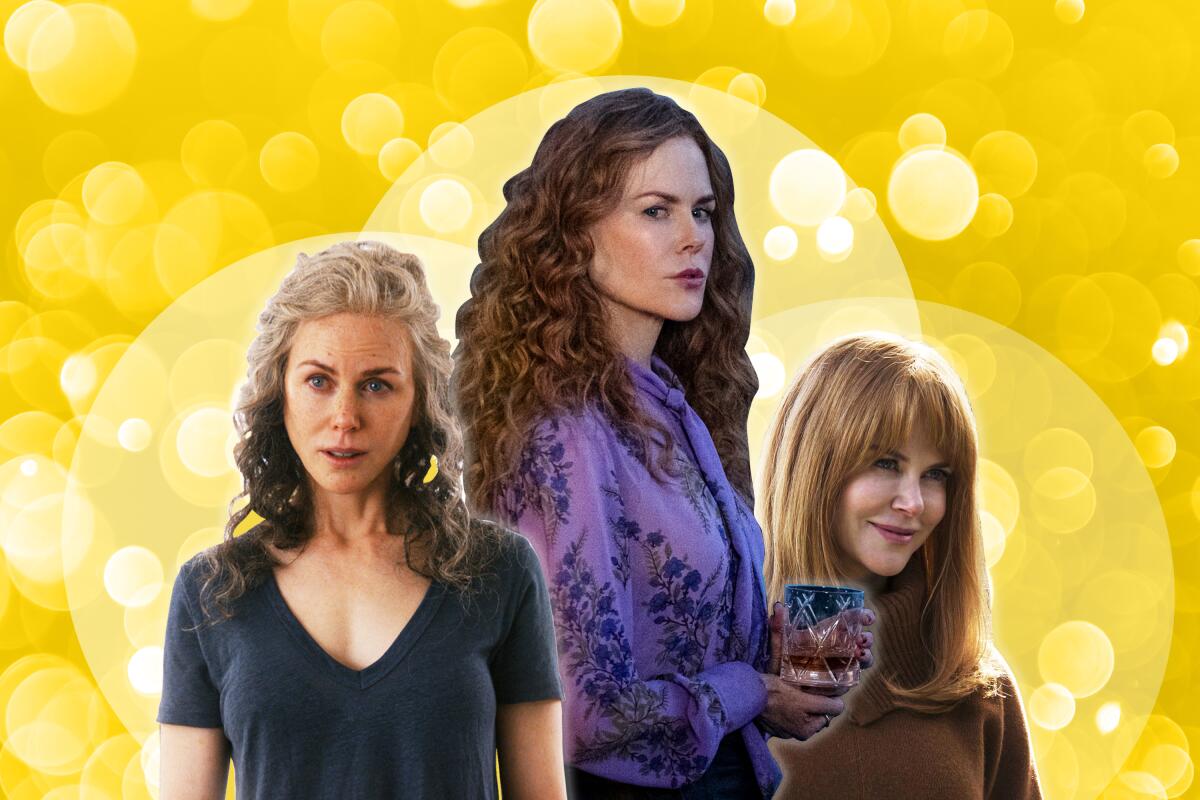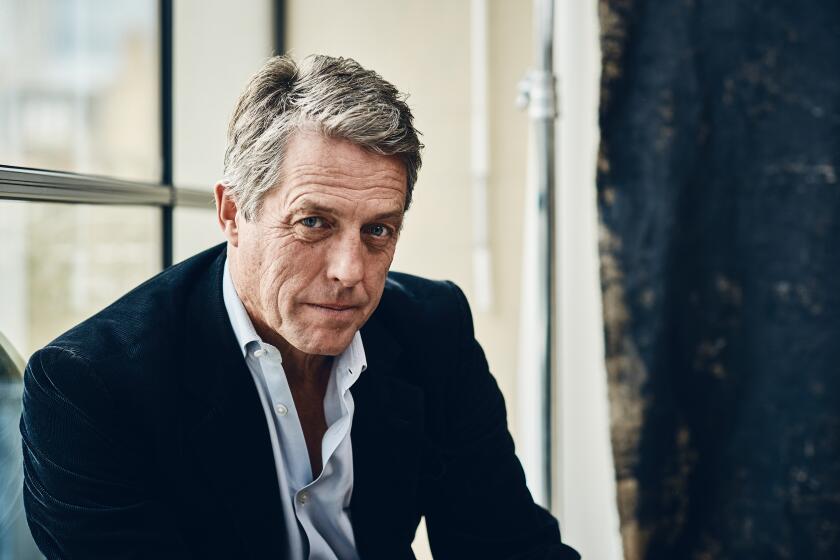How Nicole Kidman’s rich white women took over television

- Share via
“The Undoing” had seemingly everything going for it.
A Sunday-night time slot on HBO, real estate that still carries weight with audiences in an era of on-demand viewing. A script by David E. Kelley, one of TV’s most prolific and celebrated writer-producers. Susanne Bier, an acclaimed Danish auteur, directing all six episodes. Hugh Grant, a beloved comic performer in the throes of a fascinating career renaissance.
And, perhaps most of all, it had Nicole Kidman, a Big Time Movie Star who has fast become the medium’s favorite status symbol. An Oscar-winning performer who confers instant prestige on every project she joins, Kidman gravitates toward playing a breed of affluent but troubled wife and mother that’s become pervasive on TV.
Since portraying an abused wife in the HBO murder mystery “Big Little Lies” in 2017, a performance that earned her an Emmy Award, Kidman has starred in the series’ second season, reunited with filmmaker Jane Campion for “Top of the Lake: China Girl” and, as an executive producer, gobbled up the rights to acclaimed plays and bestselling novels to make into TV shows that will no doubt vie for awards in the years ahead. She and “Big Little Lies” costar Meryl Streep team up once again in the musical “The Prom,” directed by Ryan Murphy, which premiered Friday on Netflix.
By returning to television after a three-decade absence, Kidman reinvigorated her career as an actress and producer. Other A-list stars have followed suit and embraced TV — especially the limited series — as an ideal vehicle for female-centered narratives. Yet the response to “The Undoing,” focused on its opulence rather than its psychological acuity or cinematic artistry, shows how easily high-end storytelling is confused with TV shows about rich people and their problems filmed in expensive locations.
In “The Undoing,” Kidman stars as Grace Fraser, a Manhattan therapist with oodles of old family money, a townhouse feet away from Central Park and a child in the city’s most exclusive private school. Ratings for the series rose steadily over its six-week run, as did social media chatter, suggesting audiences were engrossed in the central mystery: Was Grace’s charming husband, Jonathan (Grant), a celebrated pediatric oncologist, actually a killer?
Yet in the end, what people wanted to talk about, more than Kidman’s ability to wring drama out of dialing a phone or dubious plot twists involving a murder weapon run through the dishwasher, were Grace’s coats. The character was fond of outerwear in autumnal shades and sumptuous fabrics, worn during long walks around the city — a look that inspired much swooning (and derision, from those who thought she looked ready to relocate to Middle-earth).
The actor, once known for romantic comedies, has taken on darker roles of late — including as a potentially dangerous version of himself in HBO’s “The Undoing.”
Viewers also speculated about the real-world value of Grace’s home (asking price: $30 million), analyzed the art on the walls of her father’s apartment (Francis Bacon) and praised the return of Kidman’s Botticelli waves, rarely seen this millennium.
This fixation with Kidman’s aesthetic — and how she does or doesn’t transform herself for a role — is not exactly new. Even the earliest profiles of her, written when she began to achieve movie stardom in the late ’80s, inevitably described her “porcelain” skin and “fiery” curls.
Ever since she donned a fake nose for her Oscar-winning role as Virginia Woolf in ‘“The Hours,” she’s maintained a reputation as an audacious risk-taker, someone not only willing to sublimate her beauty when called for but also to knock on invisible doors (“Dogville”) and pretend to take a bath with a 10-year-old boy (“Birth”). Kidman is not exactly a chameleon — it’s hard to disappear into the background when you are nearly 6 feet tall — but she has a fondness for deglamorizing herself through prosthetics and especially wigs, the dazzling variety of which she’s worn on-screen enough to inspire Instagram tributes and critical analysis (just don’t ask her about them at a screening).
Perhaps because of her statuesque looks, highbrow taste and tendency to land on the cover of Vanity Fair, Kidman is often cast as sophisticated, cosmopolitan characters — English aristocrats, Sorbonne-educated interpreters, Hollywood stars turned actual princesses.
The same propensity has carried over into Kidman’s TV work, fueled by the medium’s own quest to amass the urbane cachet of its elder sibling, film.
Steven Soderbergh did it. So did Jane Campion, Park Chan-wook, Ava DuVernay and Spike Lee.
“Big Little Lies” is the quintessential example. Thirty years after Kidman’s career took off with the Australian miniseries “Vietnam,” the project — another twisty murder mystery from Kelley and HBO about rich, gossipy married people and their children, set in a moneyed, rarefied milieu — invites viewers to think more critically about class, gender and domestic violence while vicariously enjoying the obscene wealth. It works simultaneously as a tart satire of bourgeois, pinot-swilling Californians, an empathetic story about women struggling to retain a sense of self amid marriage and motherhood, and an intoxicating hit of lifestyle porn.
Sporting a fringed strawberry blond hairstyle reminiscent of Daphne from “Scooby-Doo,” Kidman plays Celeste Wright, a former lawyer trapped in a violent marriage to the handsome Perry (Alexander Skarsgaard). From the outside, they appear to be the perfect couple, right down to their luxury real estate: a sleek waterfront home complete with a walk-in closet the size of the average Whole Foods. But in reality, Perry is a controlling wife-beater and, it is gradually revealed, sexual predator.
“Big Little Lies,” based on Liane Moriarty’s bestselling novel and directed by Jean-Marc Vallée, was developed by Kidman and her costar Reese Witherspoon, who turned to producing out of frustration with a lack of enticing film roles for women. As Kidman told The Times in 2018, she nearly quit acting after a string of disappointing films, including the biopic “Grace of Monaco,” which was booed at the 2014 Cannes Film Festival. “You start out as flavor of the month and then you’re not,” she said at the time, “you have some things that work and some that don’t, and suddenly no one’s interested.”
“Big Little Lies” changed that, winning eight Emmys and nabbing hit ratings for HBO. Its success paved the way not only for Kidman’s appearance in the rivetingly weird “Top of the Lake: China Girl,” a mystery exploring surrogacy, sex work and what writer-director Campion called “the secret world of motherhood” but also for other star-studded series featuring acclaimed actresses, some making the leap to TV after years in movies. Among the most talked-about have been “Sharp Objects” with Amy Adams, “Mrs. America” with Cate Blanchett, “Little Fires Everywhere” with Witherspoon and Kerry Washington, and the second season of “Big Little Lies,” which upped the dramatic ante — and star power — by recruiting Streep, one of the few actresses in Hollywood with more insta-prestige than Kidman, to play Celeste’s vindictive mother-in-law. This year, all five shows nominated for limited series at the Emmys were led by women.
In HBO’s ‘The Undoing,’ starring Nicole Kidman and Hugh Grant, David E. Kelly creates a kind of East Coast companion to ‘Big Little Lies.’
Because of changes in the movie business over the last 20 years, the hot literary adaptations and historical dramas that used to be made into Oscar-season films now wind up on premium cable or streaming services as limited series — which has become TV’s most prestigious mode of storytelling. Actors and directors are drawn to the challenge of shows like “Chernobyl,” “Watchmen” or “Olive Kitteridge” and also comforted by the promise of a clear end date.
Kidman has quickly become the poster girl for this relatively new form of upscale television. As Grant recently told The Times, he was drawn to “The Undoing” because of Kidman’s involvement — “clearly Nicole is classy — all those Oscars,” he said — and the imprimatur of HBO, which he called “the Rolls-Royce of television.”
But a lesser-discussed trend in TV is the resurgence of the middlebrow thriller, a genre that has become endangered at the multiplex but lives on in suspenseful melodramas like “The Affair” and “You.” The ’80s and ’90s were a heyday for movies about terrorized yuppies, in the mode of “Fatal Attraction,” “Single White Female” and “The Hand That Rocks the Cradle.” Some of these projects even starred Kidman: She made her international breakthrough in “Dead Calm,” playing a bereaved young mother who fends off a psychopath while on a yachting trip with her husband, and she also starred in the Aaron Sorkin-scripted noir “Malice,” as a young wife whose ovaries are removed by a surgeon with a God complex (long story).
“The Undoing” in this regard feels less like cutting-edge TV than a throwback — and not just because Kidman is back to her “Days of Thunder”-era mane. HBO may have positioned the series as its next sophisticated drama, and the network will almost certainly wage an aggressive campaign for it come Emmy season, but ultimately, “The Undoing” is a watchable, well-acted but poorly plotted whodunit about extraordinarily rich people. (The great twist? The person you suspected of being the killer in Episode 1 … actually did it.)
Arguably, the conversation about “The Undoing” revolves around accouterments of extreme privilege — including Grace’s coats — because the series has little to say about class beyond “Look at these incredibly rich people and their messy lives.” “The Undoing” is wealth as wallpaper: there to provide a pleasing backdrop and not much more.
Kidman, whose company Blossom Films has a first-look deal at Amazon Studios, reportedly wants to make more projects in this vein. According to Amazon chief Jen Salke, the actress-producer told her she wanted to make the kind of “sexy date date-night movies that no one’s making anymore, like ‘No Way Out’ or ‘Cruel Intentions.’ Those kind of ‘I need to stay home and just drink wine with my girlfriend, or my boyfriend, husband, and watch this.’ This is really Nicole’s thing.”
Kidman has already acquired the rights to “Pretty Things,” about a well-educated grifter who targets an heiress-turned-influencer at Lake Tahoe, and she’s collaborating again with Kelley and Moriarty on the Hulu miniseries “Nine Perfect Strangers,” in which she plays the proprietor of a boutique wellness retreat.
For Kidman, it’s promising — if now familiar — turf. Let’s just hope that the next time around, she gives us more to talk about than her coats.
More to Read
The complete guide to home viewing
Get Screen Gab for everything about the TV shows and streaming movies everyone’s talking about.
You may occasionally receive promotional content from the Los Angeles Times.







